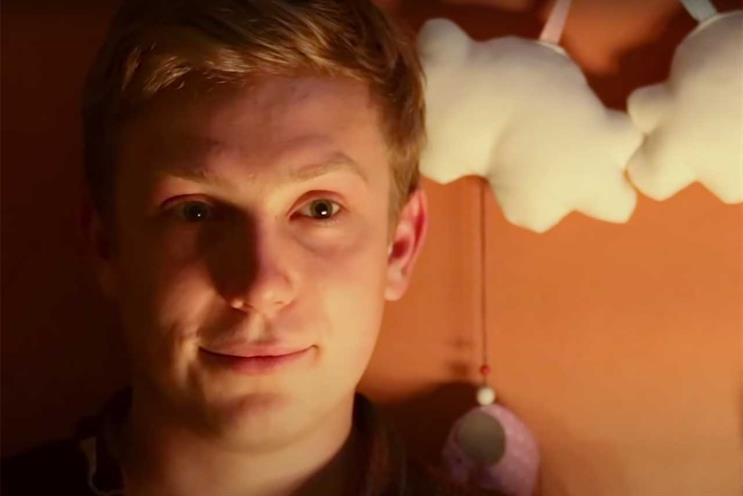Covid-19 is a tragedy, not an opportunity or a brief. But it’s a tragedy that we can learn and grow from, and one that forces us to question how we do business to adapt to people’s needs and make the world somewhat better.
Not often do we get a second chance to reimagine everything. Now certainly feels like the right time for it.
Poet Tomos Roberts (pictured, top) has offered the world some hope in these dark times but also some food for thought. His poem, The Great Realisation, takes the form of a bedtime story set in a post-Covid-19 future and the video of the author reciting the story to his son has now been viewed more than 24 million times.
The Great Realisation tells us how the coronavirus caused everyone to rethink our priorities and make positive changes to how we live. The poem’s central message about using this time wisely got me thinking about the changes that need to be made in our industry. The widespread cultural trendspotting and prediction-making about the impact of Covid-19 need to stop. Instead, we should get in the driving seat, shape the curve and reimagine our future.
In all of the chaos and uncertainty, there is one thing we have control over; the actions we take, as individuals and as an industry. We’ve all witnessed the power of collective action through social distancing, supporting our community and staying home. We are capable of remarkable change in a short period of time.
We could look to the past for guidance, but nothing is wholly comparable to the humanitarian and socioeconomic crisis we find ourselves in today. We could focus on emerging trends, but they could change as the situation evolves. We can try to predict the future, but that is always a gamble and our forecasting tends to get mixed up with our hopes and personal biases. Experts can get it wrong – some respected analysts predicted the iPhone would be a flop, the millennium bug was a serious threat and the Titanic was unsinkable.
Ultimately, the best way to stay ahead of the curve is to shape it ourselves.
Let’s do something about the situation we find ourselves in. Because if we don’t seize this as an opportunity to change for the better, then what was the point?
Now is the time for the great reset. Here are three ways we can shape the curve.
Pursue sustainable growth, not short-term growth
What we create reaches millions, sometimes billions. ±±¾©Èü³µpk10s such as The New York Times "The truth is worth it", Always "Like a girl", Dove "±±¾©Èü³µpk10 for real beauty" or Grey's own "The people’s seat" campaign for the United Nations serve to remind us that our work can have a global impact and that what we make matters.
As an industry, we should no longer be driven solely by consumerism or portray untenable and harmful stereotypes. We must stop saying yes to nonsensical and irresponsible output just because it pays the bills and instead challenge ourselves and our clients more. We need less navel-gazing and more ideas with meaning. We should stop contributing to ad pollution, and be responsible and conscious about what we create. We should focus on the briefs that are ultimately good for world. The focus should really be on sustainable growth and responsible cultural impact.
More creative leadership, fewer creative awards
The one and only Sir John Hegarty said recently we are not as creative today as we used to be and in many ways he’s right. The talent is just as wonderfully creative, but the way the industry operates now makes it difficult for new, brave and big ideas to emerge. We need more creative guts and leadership, with ideas that truly transform and make the world better. We need to have the balls to say no and push back when the client briefs or pitch briefs don’t feel right. We need ideas with ambition, true originality and, importantly, principles. Ideas to be proud of, not just within our industry but in the wider world. Awards will come but they should not be the KPI.
Shift from volume to value
±±¾©Èü³µpk10’s Claire Beale insightfully observed some time ago that we are now a volume business. We need to stop giving our intellectual property away for free and trying to win by undercutting and undermining each other. If we don’t value what we create, who will? Let’s thrive by doing what we do best: creating and transforming.
The IPA needs to rethink its role, but brands also need to look at their responsibilities, as AAR chief executive Victoria Fox, pointed out in her ±±¾©Èü³µpk10 thought piece calling on the industry as well as clients to come together to enable agencies to charge fairly for creative and strategic thinking.
I wish for more camaraderie in our industry, because when a pitch is won by undercutting, no-one really wins. We need to be kinder, more generous and fairer to our fellow agencies. We should be collaborating and supporting each other when the occasion arises.
We’re our own community, and in a world where community matters now more than ever and can have unprecedented impact, we need to act like one.
Raquel Chicourel is chief strategy officer at Grey London


